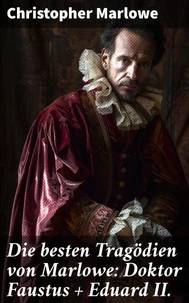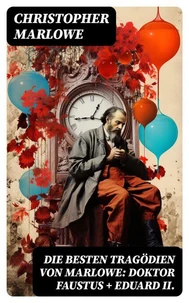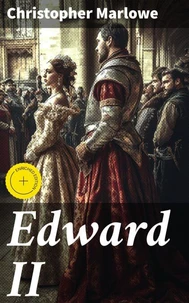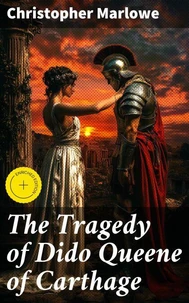Massacre at Paris. Shadows of Betrayal: A Historical Tragedy of Power and Violence in Renaissance Paris
Par :Formats :
Disponible dans votre compte client Decitre ou Furet du Nord dès validation de votre commande. Le format ePub est :
- Compatible avec une lecture sur My Vivlio (smartphone, tablette, ordinateur)
- Compatible avec une lecture sur liseuses Vivlio
- Pour les liseuses autres que Vivlio, vous devez utiliser le logiciel Adobe Digital Edition. Non compatible avec la lecture sur les liseuses Kindle, Remarkable et Sony
 , qui est-ce ?
, qui est-ce ?Notre partenaire de plateforme de lecture numérique où vous retrouverez l'ensemble de vos ebooks gratuitement
Pour en savoir plus sur nos ebooks, consultez notre aide en ligne ici
- Nombre de pages124
- FormatePub
- ISBN4057664643636
- EAN4057664643636
- Date de parution25/11/2019
- Protection num.Digital Watermarking
- Taille524 Ko
- Infos supplémentairesepub
- ÉditeurGOOD PRESS
Résumé
In 'Massacre at Paris, ' Christopher Marlowe ablazes a dark path through the treacherous political landscape of 16th-century France, woven around the infamous St. Bartholomew's Day Massacre. This historical play adopts a fast-paced and intense style reminiscent of Marlowe's earlier works, simultaneously embracing both tragic and dramatic elements. The text'Äôs vivid imagery and sharp dialogues reflect the tumultuous period's religious and civil strife, highlighting the human capacity for both cruelty and fervor.
Marlowe's nuanced exploration of power, betrayal, and the moral ambiguities of leadership situates the play within the broader context of Elizabethan drama, marked by themes of Machiavellianism and the consequences of fanaticism. Christopher Marlowe, a contemporary of Shakespeare, was steeped in the volatile atmosphere of his time, grappling with the tensions of religious conflict and emerging national identities.
His background as a university-educated playwright and his involvement in the political and intellectual circles of his era informed his fascination with the darker aspects of humanity and authority. Marlowe's own life'Äîmarked by controversy and a mysterious demise'Äîparallels the tumult he depicts in his works, leading him to create a profound commentary on power and its pitfalls. 'Massacre at Paris' is a compelling read for those interested in historical theater and the exploration of human nature within the framework of political turmoil.
Marlowe'Äôs crisp language and stirring dramatic sequences will captivate readers, inviting them to reflect on the relevance of these themes in contemporary society. For anyone who appreciates a masterful blend of history and drama, this play stands as an essential piece of Marlowe's oeuvre.
Marlowe's nuanced exploration of power, betrayal, and the moral ambiguities of leadership situates the play within the broader context of Elizabethan drama, marked by themes of Machiavellianism and the consequences of fanaticism. Christopher Marlowe, a contemporary of Shakespeare, was steeped in the volatile atmosphere of his time, grappling with the tensions of religious conflict and emerging national identities.
His background as a university-educated playwright and his involvement in the political and intellectual circles of his era informed his fascination with the darker aspects of humanity and authority. Marlowe's own life'Äîmarked by controversy and a mysterious demise'Äîparallels the tumult he depicts in his works, leading him to create a profound commentary on power and its pitfalls. 'Massacre at Paris' is a compelling read for those interested in historical theater and the exploration of human nature within the framework of political turmoil.
Marlowe'Äôs crisp language and stirring dramatic sequences will captivate readers, inviting them to reflect on the relevance of these themes in contemporary society. For anyone who appreciates a masterful blend of history and drama, this play stands as an essential piece of Marlowe's oeuvre.
In 'Massacre at Paris, ' Christopher Marlowe ablazes a dark path through the treacherous political landscape of 16th-century France, woven around the infamous St. Bartholomew's Day Massacre. This historical play adopts a fast-paced and intense style reminiscent of Marlowe's earlier works, simultaneously embracing both tragic and dramatic elements. The text'Äôs vivid imagery and sharp dialogues reflect the tumultuous period's religious and civil strife, highlighting the human capacity for both cruelty and fervor.
Marlowe's nuanced exploration of power, betrayal, and the moral ambiguities of leadership situates the play within the broader context of Elizabethan drama, marked by themes of Machiavellianism and the consequences of fanaticism. Christopher Marlowe, a contemporary of Shakespeare, was steeped in the volatile atmosphere of his time, grappling with the tensions of religious conflict and emerging national identities.
His background as a university-educated playwright and his involvement in the political and intellectual circles of his era informed his fascination with the darker aspects of humanity and authority. Marlowe's own life'Äîmarked by controversy and a mysterious demise'Äîparallels the tumult he depicts in his works, leading him to create a profound commentary on power and its pitfalls. 'Massacre at Paris' is a compelling read for those interested in historical theater and the exploration of human nature within the framework of political turmoil.
Marlowe'Äôs crisp language and stirring dramatic sequences will captivate readers, inviting them to reflect on the relevance of these themes in contemporary society. For anyone who appreciates a masterful blend of history and drama, this play stands as an essential piece of Marlowe's oeuvre.
Marlowe's nuanced exploration of power, betrayal, and the moral ambiguities of leadership situates the play within the broader context of Elizabethan drama, marked by themes of Machiavellianism and the consequences of fanaticism. Christopher Marlowe, a contemporary of Shakespeare, was steeped in the volatile atmosphere of his time, grappling with the tensions of religious conflict and emerging national identities.
His background as a university-educated playwright and his involvement in the political and intellectual circles of his era informed his fascination with the darker aspects of humanity and authority. Marlowe's own life'Äîmarked by controversy and a mysterious demise'Äîparallels the tumult he depicts in his works, leading him to create a profound commentary on power and its pitfalls. 'Massacre at Paris' is a compelling read for those interested in historical theater and the exploration of human nature within the framework of political turmoil.
Marlowe'Äôs crisp language and stirring dramatic sequences will captivate readers, inviting them to reflect on the relevance of these themes in contemporary society. For anyone who appreciates a masterful blend of history and drama, this play stands as an essential piece of Marlowe's oeuvre.








